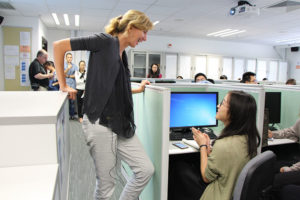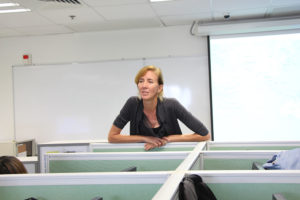by Cristina Wu
photos by Mathilda Guo
Labor abuse may be an open secret in many supply chains around the world, but journalists need to find out the problems, a Pulitzer Prize Winner said in a lecture today.

Student Xiaoqing asks McDowell about female journalists.
Many countries, including Thailand, Taiwan, China and the US have slaves on fishing boats, Associated Press reporter Robin McDowell, who won a Pulitzer for her reporting on slavery in the fishing industry, said.
“What we wanted to show was not the Thailand was doing this but something that we pursued to connect with dots, so people could see this is happening in industry wide,” McDowell said.
In the one-year investigation, McDowell and her team exposed labor abuses in Southeast Asia’s fishing industry. Their reporting successfully freed over 2,000 slaves and inspired reforms in the industry.
Labor abuse is an ongoing problem, McDowell said. Many people are on the side of the business and it is a common joke, she said, adding that this is why they decided to make people care.
“So often in the case, it’s not when governments put pressure on businesses, it’s not when human right activists put pressure on groups, it’s when consumers say ‘we are not going to buy this anymore’, and that’s when we start seeing change,” she said.
Production is done piece by piece in different parts of the world, so that people often fail to know what they are buying is from sweatshop or a slave, she said.

She used the shoe industry as an example. “Because the industry was divided into such tiny little pieces, maybe someone is making the shoelace, and that is the problem story,” she said. Companies like Nike that buy the shoes may not realize themselves about this problem in their supply chains until journalists expose it, she said.
Their team focused on one particular supply chain, but the bigger problem it revealed is worthy of continuous concern, she said.

